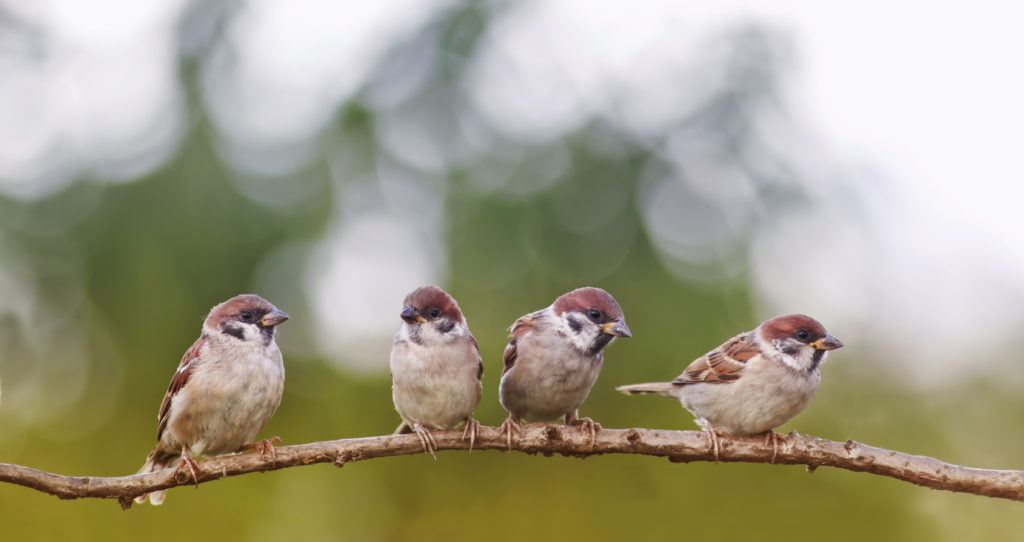Quick Hits
Daily brief research updates from the cognitive sciences

Waking up to an early morning chorus of birdsong is nice. No doubt about that. But the benefits could be much more significant than just a fleeting feeling of positivity (and followed by a groan to get out of bed by some).
Researchers at Kings College London have just reported on the results of a study that tracked people’s exposure to birdsong and the resulting mental health impact – with some very positive results.
Hammoud et al. tracked 1’292 participants over three years who completed an impressive 26’856 assessments. They used an app that asked them three times a time whether they could hear birdsong and then followed up with questions on mental health.
What did they find?
They found that seeing or hearing birds was associated with an improvement in wellbeing and that this can last up to eight hours. Not bad for a bit of birdsong. What’s more they also found that this also improved wellbeing in those suffering from depression.
This supports plenty of other research into the benefits of nature and specifically of just birdsong. I reported on the positive effects of biodiversity and birdsong here. But these researchers were also able to account for co-occurring other environmental factors such as seeing tress – we also know greenspace has a positive benefit – and found that birdsong alone could account for positive benefits.
So, that’s all good news – surprising and effective method to improve mental wellbeing – so open the windows and listen to the birds. It will do you good.

Andy Habermacher
Andy is author of leading brains Review, Neuroleadership, and multiple other books. He has been intensively involved in writing and research into neuroleadership and is considered one of Europe’s leading experts. He is also a well-known public speaker, speaking on the brain and human behaviour.
Andy is also a masters athlete (middle distance running) and competes regularly at international competitions (and holds a few national records in his age category).
References
Ryan Hammoud, Stefania Tognin, Lucie Burgess, Nicol Bergou, Michael Smythe, Johanna Gibbons, Neil Davidson, Alia Afifi, Ioannis Bakolis, Andrea Mechelli.
Smartphone-based ecological momentary assessment reveals mental health benefits of birdlife.
Scientific Reports, 2022; 12 (1)
DOI: 10.1038/s41598-022-20207-6
More Quick Hits
Coffee Makes Business Teams More Effective
Quick HitsDaily brief research updates from the cognitive sciences just couldn’t resist reviewing this piece of research, from a few years ago, after I stumbled across this (likely because some background algorithm had recommended it to me based...
Caffeine Makes You More Prone to Impulsive Buying
Quick HitsDaily brief research updates from the cognitive sciences fascinating piece of research just published shows that drinking coffee makes you more impulsive. That means you are likely to buy more, and more items you actually don’t need....
Healthy Brains Are Hotter Than You Think
Quick HitsDaily brief research updates from the cognitive sciences hen we get sick we get a fever and we all know what our body temperature should be: around 37°C. Too much above that and we have a fever, and too much below and we risk...
Unpredictable Parents Disrupt Brain Circuitry in Children
Quick HitsDaily brief research updates from the cognitive sciences ntuitively we all know that good parenting is essential to kids’ healthy development. We all agree on that. But as soon as we try to define what good parenting is we then enter into...
A New Study on Inter-Brain Synchronisation
Quick HitsDaily brief research updates from the cognitive sciences n case you didn’t know it brain synchronisation (or inter-brain synchronisation) is a thing. And a pretty cool thing. This happens when two, or more, people do similar things...
Unique Social Genes in Human Beings
Quick HitsDaily brief research updates from the cognitive sciences ne differentiating factor with human beings is our pro-sociality. This means we are a social species, and this sociality is seen in our ability to empathise, be socially tolerant,...






